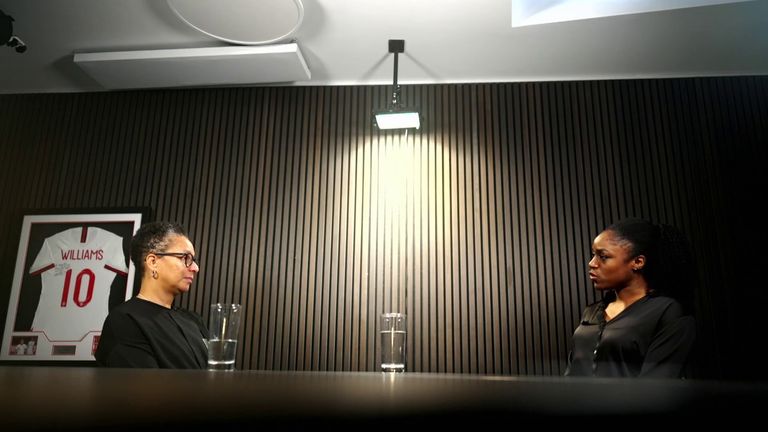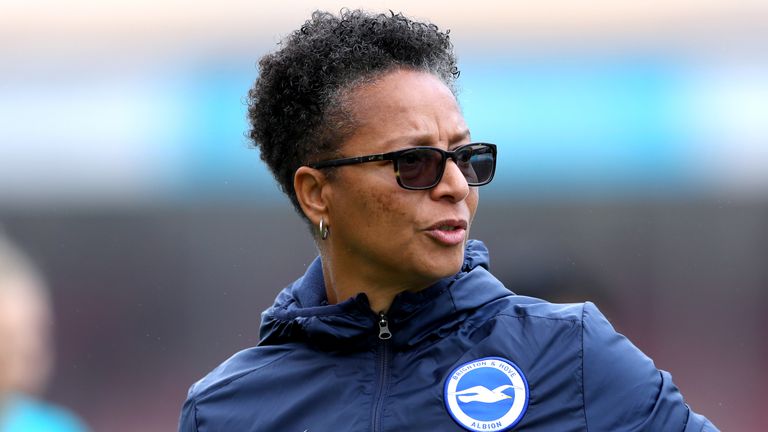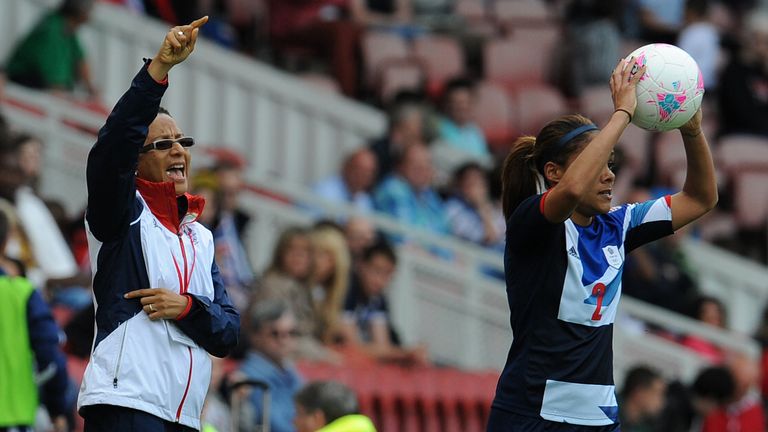Hope Powell has revealed how she defied her Mum to play football, how she built England Women and the importance of representing her communities.
Powell is perhaps best known for her time as a coach with the Lionesses, Team GB and, more recently, with Brighton. But she was also an experienced player herself, amassing over 60 England caps and a raft of other domestic accolades.
However, growing up in West Indian culture in south London in the 60s and 70s, it was not the most conventional career path for a girl – and Powell’s mother even tried to dissuade her from football.
“When I was growing up and playing on the estate, I honestly thought I was the only girl that played,” she told Jess Creighton on Inside the WSL.
“Then I joined Millwall Lionesses at the time at the age of 11 and that was mind-blowing. I went to a first training session and there were loads of girls playing football. I was shocked that there were other girls playing.
“Back then, there were a couple of people and their dogs, family members [who would watch the games]. We played on Clapham Common, for example, and people would walk by and double check that it was girls playing.
“It never bothered me, not while I was playing, or the girls I was playing with. It was just the love of the game. It was as competitive as it ever was, but the pitches were awful. You had to put your own nets up, half-time was orange juice.
“My Mum didn’t like it at all. She is West Indian and within that culture, girls playing football isn’t seen as a thing.
“So when I started to play, she couldn’t understand what was going on. She said I couldn’t go so I just snuck and when I got home, you can imagine that was it – there was all hell to pay.
“She was from Jamaica, came here very young, trying to make a better life and really struggled. She wanted me to do well at school – that was priority. Girls couldn’t make a living in football, there’s no way you can make a profession out of football so I think she was trying to look out for me and I completely understand it.
“But what she realised is it kept me out of trouble and I was good at it.
“What was really lovely, and still is today, was when she came and started supporting, she became obsessed. She sometimes calls me up and says ‘do you know the girls are playing, are you watching?’
“She came over to Germany when we played in the Euros final, she came to all the England games. She is now my biggest fan.”
How extra training helped Powell excel
Powell received her first England call-up at the age of 16, but described the difficult circumstances in which the women’s national team played in at the time.
She revealed: “I knew at the age of 11 that I was good enough to play for England, and that’s not being arrogant, but I was better than every boy on my estate and every boy I played against. When I played for Millwall, I was arguably the best player.
“I found out there was an England team and I thought, ‘that’s the next thing I’m going to do’.
“It was a weekend, Friday to Sunday. You’d meet up on the Friday and you’d get on the train with your big case, your own kit and you’d go for three days of hell, because it was hard work. After my call-up, I was excited and looking forward to it.
“But I was 16, so it was a bit nervy. You go into that environment as a young kid and the players that have been there longer look at you and think ‘you’re not taking my place’, which is natural.
“Everybody wants to play, but I was thinking ‘I will be taking your place’.”
However, her England debut made Powell realise she needed to improve her fitness and strength to be able to compete at international level. So she came up with an idea that would transform her game.
“I think Alan May, who was my coach for Millwall, was ahead of his time. I asked him to write me a programme so I can go and do a bit extra,” she reflected.
“Back in those days, you only trained two nights a week on concreate. So after school, you’d get on a bus and go training, getting home late – it’s a different world, but that’s how it was then.
“But I thought, ‘I’m not fit enough to compete with women who are physically stronger, more mature, I need to do something’, so I asked him to do me a programme and he did.
“Then I would go out in the evening on my own and do these crazy runs – which is why I can’t walk today, my knees are gone – and just tried to get fitter and stronger.”
‘I cannot fail this for me, for women, for future black coaches’
Then, in 1998, a surprise call from the FA came asking her to take over as England manager. However, Powell took her time in accepting the job.
“I was terrified!”, she said. “Robin Russell said, ‘Hope, we would like you to consider being the next England manager?’ I was calm on the top, but underneath, my legs are going. I hadn’t managed before, so I started to ask other questions like, ‘have you considered anybody else? Why are you picking me?’
“It was a big deal, but I wanted to be sure it was for the right reasons, that they actually valued what I could bring to the table.
“I went around to Brenda’s [Sempare] and said, ‘they’ve offered me this job, I don’t know if I should take it, why would they do that’. She looked and me and went, ‘are you crazy?’ As did my partner at the time, my family, they said I had to take it.
“I was a bit like, ‘it’s alright for you to say I’ve got to take it, but I’m the one who has to do the job’. It was Kelly Simmons who actually said to me, ‘you’ll be sitting in the changing room with an England manager thinking you could’ve done that job’ and she was probably right.
“I took the week and that’s what made my mind up. One of the things I thought was, ‘I cannot fail this, for me, for women, for future black coaches’.”
It was this representation that saw her grow dreadlocks while England manager, bringing attention and visibility to her community.
“When I got the job at the FA, I didn’t have dreads. I grew them while I was at the FA to make a statement, to say I’m representing black people from everywhere. I guess I’m a bit militant as well, I thought it’d be cool and decided to do it.
“For me, it was a big deal because I knew I was being looked at by everybody. Everyone thinks they can do a better job than you anyway, whether it’s male or female. I knew eyes would be on me and it was just me. I didn’t have an assistant, all these people were part time, I had nothing.”
She went on to develop and build England’s teams at youth level and even took big risks with her senior players to develop their experience.
“I came in with the senior team and UEFA had just introduced an U18 or U19 European Championships. We didn’t have a team so I had to put one together that could go and represent in the European Championships, so I was responsible for that.
“[The senior team needed] more games, more contact time with players and playing against teams that could challenge them.
“We played Norway in a game and we played all the kids knowing we would lose and we lost 8-0. Kate Chapman played, Fara [Williams] might have played, Kelly [Smith] definitely played – that generation, they had to play it to appreciate that if they wanted to be the best, you have some work to do.
“So I had to take the risk that we were going to get hammered in order for players, staff and FA to recognise we need this and this. I also introduced centralised contracts so the players could dedicate more time to training.
“For the 15 years I was there, every opportunity I felt like we needed something to get better, I would have that conversation. Going to the board meetings and it was quite a fight because a lot of the time, it was a no.”
Powell eventually left her role with England in 2013, naming the likes of Kelly Smith, Fara Williams and Sky Sports’ own Karen Carney among her favourite players to have coached.
“I didn’t step away, they removed me, which is OK because it’s the game,” Powell said of her departure.
“It was interesting because it was 2013 and we didn’t do as well as we would have liked and after that, the next generation was ready and I would’ve changed things.
“I would like to have stayed and I thought I still could have added value, but it’s football, isn’t it?
“Kelly Smith doesn’t understand about coaching, she’s just a player, so that’s just a waste of time. Sometimes, the best players don’t appreciate what they’re doing because it’s so natural.
“She had a bit of a lack of confidence in her ability, would you believe, so I said to her, ‘every time you get the ball, I just want you to dribble’ just to get her confidence back. Put a player in front of her with a ball and she’s going to go round you, but she sometimes didn’t realise what she was doing in the moment because it was so natural.
“Fara Williams was always going to be somebody who would be in the game. She was addicted to football, but really enjoyable to coach. Karen Carney too, she came in very young and probably didn’t have an appreciation at the time of how good she was.
“Casey [Stoney] was on a journey when she first came in. She was a difficult kid, we had some challenges with her.
“She had a difficult time that we had to knock out of her pretty sharpish, but also had a real understanding of the game that made it pleasurable at times. It wasn’t always easy because everybody wants to play and thinks they’re good enough to play, but as a manager, you have a really tough decision and you can only play 11 players.
“It really makes me smile when I see them doing punditry and speaking so eloquently about the game and I’m thinking, ‘when I coached you, you didn’t have a clue!’ It just shows how people develop and mature.”
Looking to the future
Powell went on to spend five years at Brighton – ‘I think I took the team as far as I could, but it’s a fantastic club with fantastic people’ – but while she looks for a new challenge, there is no doubt Powell is a trailblazer.
Reflecting on the future of the game, she said: “I hope that it doesn’t become a product where the welfare of the players stops becoming the priority.
“Without the players, we don’t get all the other stuff and their wellbeing and health shouldn’t be compromised due to the commercial deals or the TV coverage or playing however many games throughout the season.
“We’ve got a real opportunity to learn from the men’s game and not make those mistakes that the men’s game has. The scheduling is a challenge and I hope it doesn’t happen in the women’s game.
“I hope it’s sustainable. I’m hoping the investment will be there and it’s sustainable for a long period of time.”
Watch the full interview on Inside the WSL on Sky Sports Football and the Sky Sports Football YouTube channel from 6.30pm on Thursday.






